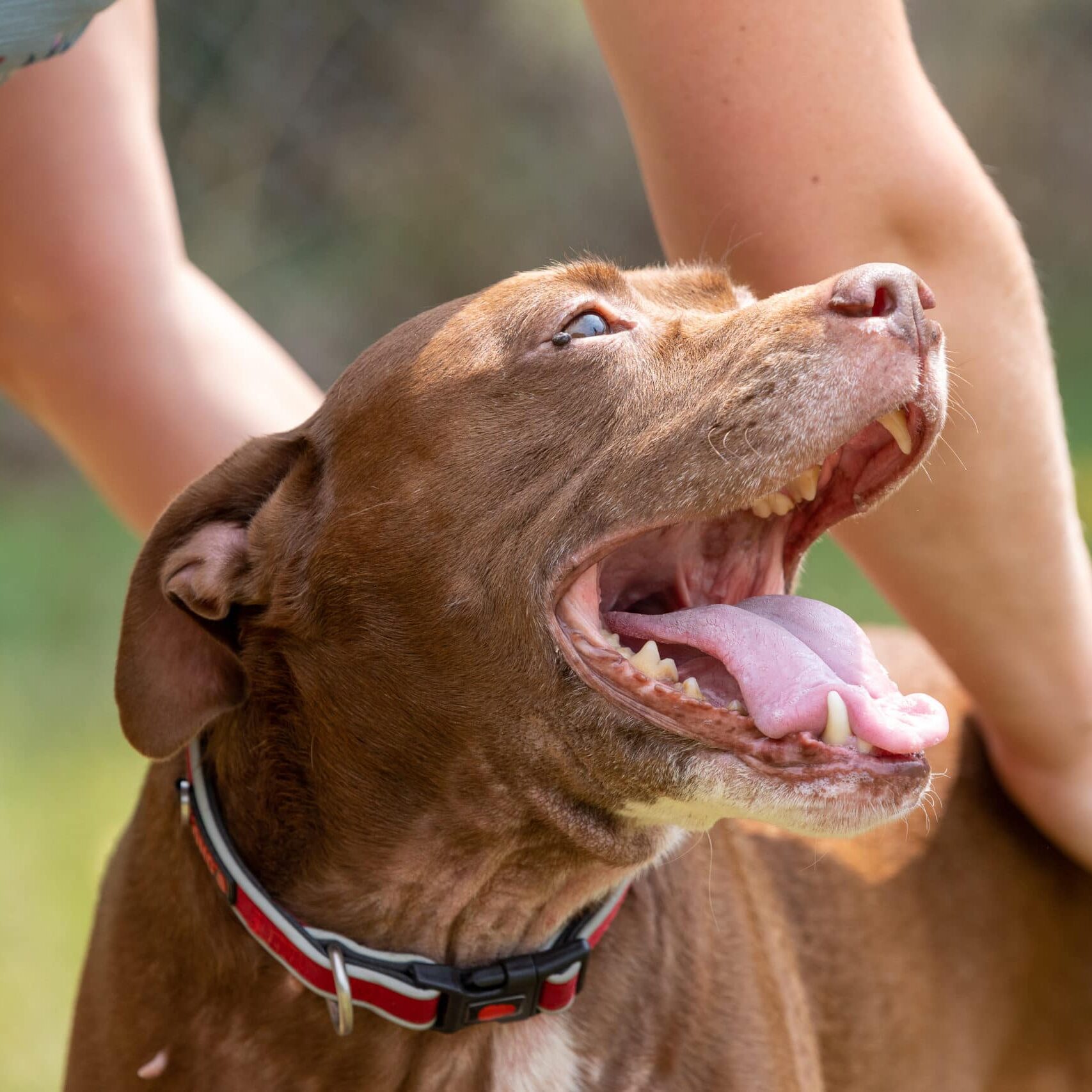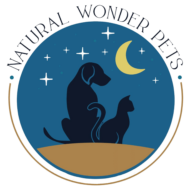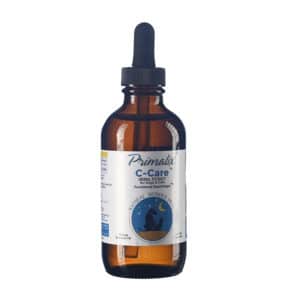Primalix C-Care
Key Benefits
- Will not contribute to the spread of tumors (unlike the possibility with fine needle aspirates or biopsies).
- Ingredients are proven scientifically in clinical studies as well as having long native traditions of being used successfully
- Customer recommended to be safe and effective for cats and dogs
- Supports immunity: a healthy pet’s body is better able to defend against attacks of abnormal cell growth or other conditions
- For more comprehensive dietary needs, boost wellness even further with our recommended adjunct to C-Care, Primalix Immune
Dosing Instructions
- Cats and small dogs (up to 20 lbs.): 1/2 dropper twice daily
- Medium dogs (21 to 60 lbs.): 1 dropper twice daily
- Large dogs (61 to 100 lbs.): 2 droppers twice daily
- Giant dogs (101 lbs. and up) 3 droppers twice daily
For dog and cat servings give orally or add to food as directed.
NOTE: One "dropper" equals one squeeze of the black bulb (1.0mL), which fills the pipette about half full. Refrigerate after opening.
Primalix C-Care
Primalix C-Care is an effective herbal formula for supplementing dietary needs and restoring wellness in dogs and cats.
Primalix C-Care is an effective herbal formula for supplementing dietary needs and restoring wellness in dogs and cats.
- Holistic blend of Burdock Root, Sheep Sorrel, Indian Rhubarb Root, Cat’s Claw Bark, and Turmeric Root
- Ingredients have been used traditionally for centuries in supporting humans, cats and dogs
- Active nutrients work to promote homeostasis and regenerate healthy cells
- Alcohol-free and completely safe thanks to the proprietary extraction solvent of organic vegetable glycerin (very low glycemic load), apple cider vinegar, and crystal-clear water
- Easy to use Functional Food Drops can be added to any wet or dry food or given directly to your pet
Primalix C-Care Ingredients
Burdock Root (Arctium lappa) scientifically known to suppress abnormal cell growth in humans and animals and to stimulate the immune system. Burdock Root purifies the blood and removes harmful toxins that may be carcinogenic. It increases beneficial bacteria and eliminates harmful bacteria that may wreak havoc on a body whose immunity health has been compromised.
Sheep Sorrel (Rumex acetosella) has been used traditionally by at least 10 native tribes in Canada and the United States in remedies for cancer. It has detoxifying effects, but its most useful feature is its power to direct the herbal nutrients in the body to act on sites of distress.
Turkish (Indian) Rhubarb Root (Rheum palmatum) can regenerate healthy cells to fight imbalances as well as cleanse and detoxify the body due to its antioxidant properties.
Cat’s Claw Bark (Uncaria tomentosa) has been used traditionally as an immune stimulant. This powerful herb is used traditionally to strengthen the immune system and improve circulation by lowering blood pressure.
Turmeric Root (Curcuma longa) is one of the best known natural fighters of cell growth gone awry. Dr. Bharat B. Aggarwal of the University of Texas MD Anderson Cancer Center in Houston not only stopped cancer cells from spreading but also killed cancer cells when curcumin, the active substance in turmeric, was added to human cells with the blood cancer multiple myeloma.
Mayo Clinic medical oncologist Timothy Moynihan, M.D. states that “Curcumin is thought to have antioxidant properties, which means it may decrease swelling and inflammation. It's being explored as a cancer treatment because inflammation appears to play a role in cancer. Lab research suggests that curcumin may slow the spread of cancer and the growth of new tumor blood vessels. It may also cause cancer cells to die. In the lab, curcumin has been studied for use in treating or preventing colon, skin and breast cancers.”
These researching physicians are experts qualified by scientific training and experience to evaluate the safety and effectiveness of pharmaceutical drugs as opposed to natural, herbal dietary supplementation. Many outcomes support natural remedies over toxic prescription drugs!
Dog Cancer? Cat Cancer? Natural Wellness is a Much Better Answer.
Dog cancer and cat cancer patients want only to feel loved and get better - not to be further assaulted with deadly chemicals and synthetic drugs.

Cat and Dog Cancer is an All-Too-Common Killer
Dog cancer and cat cancer are major killers of our companions. The older our pets get, the more likely it is they will be afflicted with the dreaded disease. Cancer is not uncommon in dogs and cats over five years old, with some reports showing that as many as half of all dogs and cats will eventually die of cancer.
Medical science concurs that cancer cells, whether human, cat or dog cancer, exist in varying numbers that are generally small enough to be kept under control by a reasonably healthy immune system. When the immune system is compromised by pharmaceutical drugs, invading microorganisms or a lack of adequate dietary nutrition, these cancer cells can gain in strength and numbers, often ending in a diagnosis of cat or dog cancer.
Three Common Types of Cat and Dog Cancer
The term “Cancer” describes not a single disease but rather a group of diseases that are characterized by abnormal cell growth. There are three basic types of cat and dog cancer.
- Carcinomas begin in epithelial tissue: the lining cells covering surfaces and interior structures. They may develop in the interior structures of glands, vessels, and ducts.
- Sarcomas develop out of connective and fibrous tissue or directly from blood vessels. These fleshy tumors are somewhat rare.
- Leukemia and Lymphoma form from blood-forming cells, bone marrow, or lymph nodes. Lymphoma is one of the most common cat and dog cancers. Tumors may form in the lymph nodes, spleen, liver, or other organs. Since lymphoma is systemic it is not practical to treat it with surgery or radiation. Lymphoma spreads aggressively to many different parts of the body.
Conventional Diagnosis
When symptoms develop that you suspect may be indications of dog cancer, your veterinarian will likely perform a blood test to rule out other possible causes and narrow down the diagnosis.
If the location of a tumor is known, your veterinarian may want to perform a needle aspirate or incisional biopsy to remove a small bit of the tumor tissue in order to examine the material under a microscope and diagnose the tumor.
The Risks of Conventional Treatment
Unfortunately, according to some professionals, there are risks in taking even a few cells from a cancerous tumor. Some cancer cells may be freed from the structure of the tumor when the incision is made or the needle inserted. These cancerous cells are then free to travel through the bloodstream, potentially forming new tumors, like seeds let loose into the wind. When cells leave the primary tumor site and develop in new areas it is known as metastasis.
Treatments for various types of cancer include radiation, chemotherapy, and physical removal/reduction of masses. Each of these treatments is associated with side effects that may make your pet sick, put her through pain, or force her to undergo the risks of surgery.
Herbal Nutrients Play a Part in Cat and Dog Cancer
Two families of genes have been found to control cat and dog cancer. Oncogenes promote the growth of cancerous tumors while tumor suppressor genes inhibit tumor growth. Clinical evidence demonstrates that certain herbal nutrients can affect which of these genes is prevalent and therefore whether tumors grow or not. While cancer may be a major killer of our companions, the evidence points to the clear possibility of avoiding a fatal outcome.
We are grateful for the abundant research supporting our herbal formula. All clinical studies and herbal nutrients were authenticated through findings in the American Herbal Pharmacopoeia, the British Herbal Pharmacopoeia, Native American and Canadian herbal remedies, Cornell University College of Veterinary Medicine, University of Maryland Medical Center, the Memorial Sloan-Kettering Cancer Center, and Purdue University School of Veterinary Medicine.

